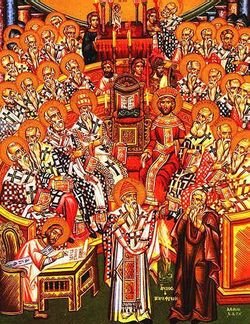 The First Council of Nicaea, convoked by the Roman emperor Constantine the great in ad 325, was the first ecumenical conference of bishops of the Christian church.
The First Council of Nicaea, convoked by the Roman emperor Constantine the great in ad 325, was the first ecumenical conference of bishops of the Christian church.The purpose of the council (also called a synod) was to resolve disagreements in the church of Alexandria over the nature of Jesus in relationship to the father: in particular whether Jesus was of the same or of similar substance as God the Father. St. Alexander of Alexandria took the first position; the popular presbyter Arius, from whom the term arian controversy comes, took the second. The council decided against the Arians.
Another result of the council was an agreement on the date of the Christian Passover, now called Easter, the most important feast of the church's life. The council decided in favour of celebrating passover on the first Sunday after the Spring Equinox, independently of the bible's Hebrew calendar, and authorized the Bishop of Alexandria (presumably using the Alexandrian calendar) to annually announce the exact date to his fellow bishops.
The Council of Nicaea was historically significant because it was the first effort to attain consensus in the church through an assembly representing all of Christendom. "It was the first occasion for the development of technical Christology". Further, "Constantine in convoking and presiding over the council signaled a measure of imperial control over the church."
More...


No comments:
Post a Comment